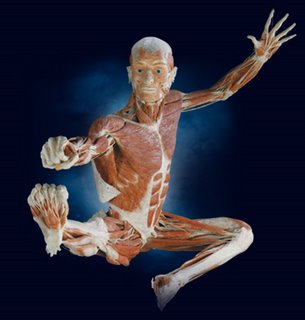According to Ricky Gervais, a great philosopher once said:
"There are three things you need in this life. The first is an important relationship with someone else, the second is an occupation that matters, and then you need to know you make a difference."
Who the fuck is Ricky Gervais... and who the fuck is said great philosopher. Tonight, two lovely... consumptions ... i moments ago, finished watching
The Office dvd on generous loan from Nate & Lissa, and earlier in the evening went to Omaha's
Jazz on the Green, tonight, featuring
Heidi Joy (doesn't she look a bit like the
Adventures In Babysitting girl?)
I think, perhaps i fear, that something about me has fundamentally changed. And i don't know quite when it started or if i want it to continue. As
Gilbertson and i sit here and write this entry, my mind is a-flutter with thoughts of what can be gleened from
The Office, and my viewing on Wednesday of
Superman Returns (the Superman thoughts definitely have a strong connection to Zizek.)
Two books arrived on my doorstep today about
Gunther von Hagens'
Body Worlds, and i'm so excited to dig into them, i can't even describe it. So i'll try. All i want to do, is (
have some fun) write some papers. As i mentioned previously, i'm actually currently garnering absolutely no pay for my days labors, but i find, more and more, that i can't stop fucking considering everything.
Why is it that Superman so often flies around saving one person at a time (how many other people are simultaneously dying that he's not saving)? Why is it exactly that von Hagens wants to industrialize the plastination (and preservation) of dead bodies? Do you really need all three of those things or is that just a 'best case scenario' and one or two will do you fine?
I don't know really, quite, what i'm getting at (my head's full enough of
Shakers that i wouldn't pay attention to me if i could help it), but Brooke said something tonight to me that worried me. She said she saw me (future-gazing here) as an old academic, sitting in a leather-clad room, puffing a pipe (she said cigar, but i think her angle must have been bad) just talking about shit. And that can't be what i want to do, can it? Can i really live a life where i just talk about things? (This is where Zizek comes in)... Or is it that in thinking about these small things, academia is really pointing at larger things, and so my function becomes something of a go-between, a being who walks in both realms & tries to take the "real world" (so obviously absent from so many who go to UChicago) to the academy & the thoughts of the academy to the real world... Maybe i could be like some kind of academic Messiah, except i'd prefer to turn my water into vodka... wheat-based, 6-time distilled, vodka.








